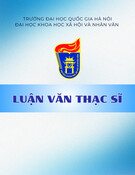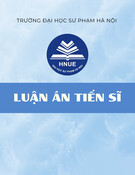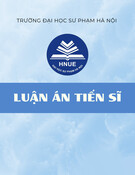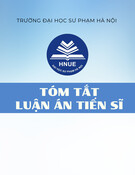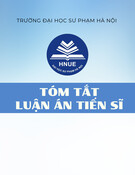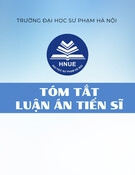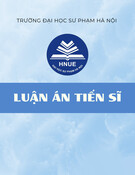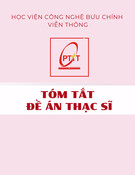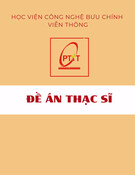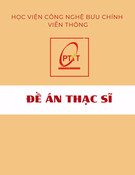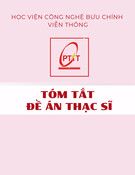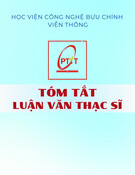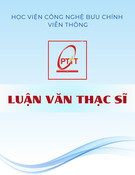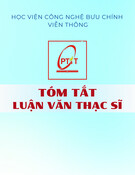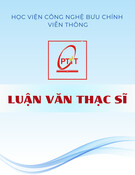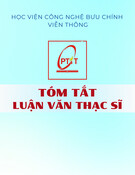
MINISTRY OF EDUCATION AND TRAINING
THE VIETNAM INSTITUTE OF EDUCATIONAL SCIENCES
NGUYEN THI THU HANG
LIFE SKILLS EDUCATION
FOR ETHNIC MINORITY ELEMENTARY SCHOOL
PUPILS
IN NORTHERN MOUNTAINOUS REGIONS OF VIETNAM
Major: THEORY AND HISTORY OF EDUCATION
Code: 62 14 01
02
SUMMARY OF DOCTORAL DISSERTATION
ON EDUCATION
HA NOI - 2013

The dissertation
was completed in: The Institute of
Educational Science
The scientific advisors:
1. ASSOC.PROF.DR. NGUYEN THI MINH PHUONG
2. DR. LUONG VIET THAI
Opponent 1:…………………………………………………………..
Opponent 2:. ………………………………………………….……...
Opponent 3:…………………………………………………………..
The dissertation will be defended before the Examination Board at
Institute level in:
…………………………………..……………………………………
…….………………………….………………………………………
Dissertation can be found at the National Library

1
INTRODUCTION
1. Reason for choosing the project
1.1. In modern society, it is necessary for people to equip not only
knowledge, health, working skills but also moral, aesthetic, humanistic
values and particular life skills.
1.2. Through life skills education, elementary school pupils will be
equipped knowledge and skills for practicing responsibility for
themselves, their family and community; improved ability behave in
various situations, etc.
1.3. The development of ethnic minority elementary school pupils
is impacted by factors such as living environment, economic situation,
habits and customs, etc. It is possible to assert that it is essential to
educate life skills for the pupils to cope with challenge and risks in the
life.
1.4. There is no detailed instruction document mentioning specific
characteristics in life skills education for elementary school pupils in
different regions, especially for ethnic minority elementary school pupils
1.5. Field survey result on life skills education for ethnic minority
elementary school pupils in Northern Mountainous regions shows that
life skills education for pupils were not taken interest by teachers; the
education was only to cope with the survey, irregularly and
discontinuously thus the education brought not effective result.
1.6. Nature and Society, and Science subjects are considered as
appropriate subjects in life skills education for ethnic minority
elementary school pupils. The life skills education for ethnic minority
elementary school pupils in Northern Mountainous regions of Vietnam,
however, is not taken interest and the life skills education is not really
effectively.
Therefore, we choose the project: “Life skills education for ethnic
minority elementary pupils in Northern mountainous regions of
Vietnam (through Nature and Society, and Science subjects)”.

2
2. Purpose
The project is to suggest solutions in the life skills education for
ethnic minority elementary pupils in Northern mountainous regions
through teaching Nature and Society, and Science subjects to stimulate
the pupils in initiative learning, improvement of life skills and education
quality of life skills through these subjects.
3. Objects and subject research
- Object research: Life skills education for elementary school
pupils.
- Subject research: Relation of factors in the life skills education
for ethnic minority elementary pupils in Northern mountainous regions
of Vietnam through teaching Nature and Society, and Science subjects.
4. Scientific hypothesis
If the suggestion of education measures of life skills for ethnic
minority elementary pupils through teaching Nature and Society, and
Science subjects in compliance with principles of education of life skills,
in accordance with characteristics of the subjects and cultural natures of
ethnic minority elementary pupils in Northern mountainous regions is
approved, these measures will positively impact on teaching the subjects
and results on the life skills education for pupils.
5. Research tasks
The project focuses on studying on theoretical basis of life skills
education for elementary pupils; surveying and analyzing actual status of
the life skills education and the process of life skills education for ethnic
minority elementary pupils in Northern mountainous regions. Thence,
we will propose basic education measures of life skills for the pupils
through teaching Nature and Society, and Science subjects; conduct
pedagogical experiments to test scientific hypothesis of the dissertation.
6. Research scope
- About research content: We focus on researching ethnic minority
elementary pupils, the life skills education for the pupils through
teaching Nature and Society, and Science subjects.

3
- About research regions: The project survey teachers in 6 provinces: Yen
Bai, Thai Nguyen, Ha Giang, Tuyen Quang, Lang Son, Hoa Binh and conduct
pedagogical experiments in 03 elementary schools.
7. Research method
Research methods such as document research; field research
(observation; survey by questionnaires; interview; specialist; and
pedagogical experiments); and mathematical statistical method in
education are applied during the research.
8. Defended theoretical points
- Life skills education for elementary pupils in general and for
ethnic minority elementary pupils in Northern mountainous regions in
particular is essential.
- Elementary pupils’ Life skills are only formed and practiced through
reaction activities and experiences of specific issues related to their daily life.
- Life skills education through teaching Nature and Society, and
Science Subjects is appropriate and highly efficient in practicing life
skills for ethnic minority elementary pupils in Northern mountainous
regions by exploiting contents and applying teaching methods.
9. New aspects of the dissertation
- Assessing some factors in living conditions impacting on the
life skills and actual education situation of life skills for ethnic minority
elementary pupils in Northern mountainous regions in Vietnam.
- Suggesting access to the life skills education with new ideas by
combining both methods: Exploiting subject contents to the life skills
education inherent in specific contexts of ethnic minority elementary
pupils in Northern mountainous regions in Vietnam, and applying
efficient teaching methods in the education.
- Designing two education measures of life skills for ethnic minority
elementary pupils in Northern mountainous regions through teaching Nature and
Society, and Science subjects with both above assess methods.

